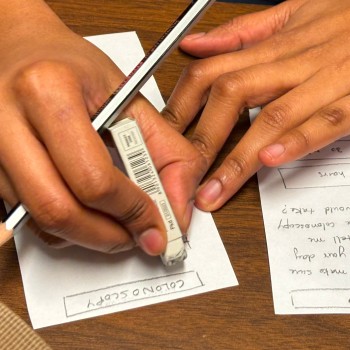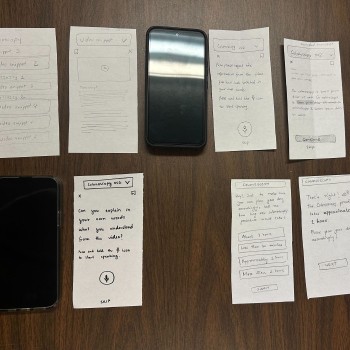Designed the first ever digital teach-back experience to improve communication →
simplifying access for 1.8M+ users, securing leadership approval in product demos

4 mos / University Collaboration
my role — Lead UX Designer + Researcher

TL;DR
As a part of improving Healthwise’s patient-clinician product relationship, I led a team of 8 to enhance patient-clinician communication, by conducting comprehensive user research including literature reviews, interviews, journey maps, wireframes, and prototypes and developed an intuitive patient education app and its framework.
context
Problem
Patients usually forget 40-80% of medical information spoken by clinicians in hospitals.
Outcome
So we made 'Digital' Teach-Back to boost memory recall of patients learning at home.
Teach-back is a technique where patients explain in their own words what their doctors told them to ensure they understood it correctly.
This is what regular, in-person teach-back looks like
Teach
Repeat
Evaluate
Explain
Reinforce
Outcome
a self-paced, education app for patients to learn at home — Digital Teach-Back. we chose Colonoscopy as a health condition to show the user journey.

Outcome
is based on the
Framework
To make the content replicable for more health conditions, I made a
Digital Teach-Back Framework.
Learning Objective
Engagement (Why)
Representation (What)
Action & Expression (How)
Instruction
Understanding Conditions & Diagnoses
Activity
Types of multimedia recommended for Interactive Activities
What you need to know
Before your surgery
Before your procedure
Articles
Videos
Articles
Videos
Fill in the Blanks
Articles
Videos
Drag & Drop
Sequence Arrangement
Inspired by the principles of Universal Design of Learning,
the framework informs the medical content of the self-paced app.
Implementation
Simply put, the framework puts content in order of the teach-back method.
Teach
Repeat
Evaluate
Explain
Reinforce
Learning Objective
Instructions
Learning Activities
to achieve this, I did the project in three folds…
Method
1
First, I spoke to relevant folks to learn about regular (in-person) teach-back.

Nurses

Product Managers + UX Researchers

Patients
Interviews helped me learn that —
Express knowledge concisely limited to 2-4 points.
Communicate to educate, without 'testing' knowledge.
2
Second, I walked in their shoes.

Journey Maps helped me learn that —
Chunk information to make information easier to follow.
Different learning activities to improve recall.
3
And finally, informed with thorough research — I designed the framework.

The Framework helped me learn that —
Mix & Match Activities to reinforce learning.
Increase or decrease the level of difficulty to improve recall.
Usability Tests
To test if this works, we conducted 3+ usability tests to find that —
In-Person Teach-Back and Digital Teach-Back, widely differ.
In-Person Teach-Back
Digital Teach-Back
Repeat information to improve understanding.
To ‘repeat’ becomes intimidating when not done in person.
Don't make it feel like you are testing them.
Quizzes are easier to interact with as compared to repeating information.


Although, the framework did the trick, we learnt that this experience cannot be human free. Digital Teach-Back needs human overview to ensure medical information is conveyed accurately.
Example
In the end, I imagined Digital Teach-Back to function with human oversight
Teach
Repeat
Evaluate
Explain
Reinforce
1
Teach
Use chunking to teach patients about their condition.

2
Repeat
Ask patients to repeat what was said to confirm their understanding.

3
Evaluate
Correct any missing information based on what was said with an explanation.

4
Explain
Ask patients to repeat what was said and confirm their understanding.

5
Reinforce
After explaining, reinforce the information to enhance understanding.

6
Verify
Report the learning outcomes to the doctor to check understanding and repeat if needed.

Documentation
I've documented every teeny, tiny detail of the project —
Last Update: 05.23.25
Made with iteration & feedback
© Sanskriti Bhatnagar 2025